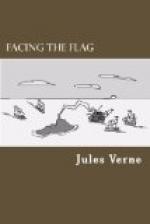In my opinion this enigmatical personage has an all important reason for hiding his origin, and I am afraid there is no indication by which I can gauge his nationality. If the Count d’Artigas speaks English fluently—and I was able to assure myself of that fact during his visit to Pavilion No. 17,—he pronounces it with a harsh, vibrating accent, which is not to be found among the peoples of northern latitudes. I do not remember ever to have heard anything like it in the course of my travels either in the Old or New World—unless it be the harshness characteristic of the idioms in use among the Malays. And, in truth, with his olive, verging on copper-tinted skin, his jet-black, crinkly hair, his piercing, deep-set, restless eyes, his square shoulders and marked muscular development, it is by no means unlikely that he belongs to one of the extreme Eastern races.
I believe this name of d’Artigas is an assumed one, and his title of Count likewise. If his schooner bears a Norwegian name, he at any rate is not of Scandinavian origin. He has nothing of the races of Northern Europe about him.
But whoever and whatever he may be, this man abducted Thomas Roch—and me with him—with no good intention, I’ll be bound.
But what I should like to know is, has he acted as the agent of a foreign power, or on his own account? Does he wish to profit alone by Thomas Roch’s invention, and is he in the position to dispose of it profitably? That is another question that I cannot yet answer. Maybe I shall be able to find out from what I hear and see ere I make my escape, if escape be possible.
The Ebba continues on her way in the same mysterious manner. I am free to walk about the deck, without, however, being able to go beyond the fore hatchway. Once I attempted to go as far as the bows where I could, by leaning over, perceive the schooner’s stem as it cut through the water, but acting, it was plain, on orders received, the watch on deck turned me back, and one of them, addressing me brusquely in harsh, grating English, said:
“Go back! Go back! You are interfering with the working of the ship!”
With the working of the ship! There was no working.
Did they realize that I was trying to discover by what means the schooner was propelled? Very likely, and Captain Spade, who had looked on, must have known it, too. Even a hospital attendant could not fail to be astonished at the fact that a vessel without either screw or sails was going along at such a speed. However this may be, for some reason or other, the bows of the Ebba are barred to me.
Toward ten o’clock a breeze springs up—a northwest wind and very favorable—and Captain Spade gives an order to the boatswain. The latter immediately pipes all hands on deck, and the mainsail, the foresail, staysail and jibs are hoisted. The work could not have been executed with greater regularity and discipline on board a man-of-war.




